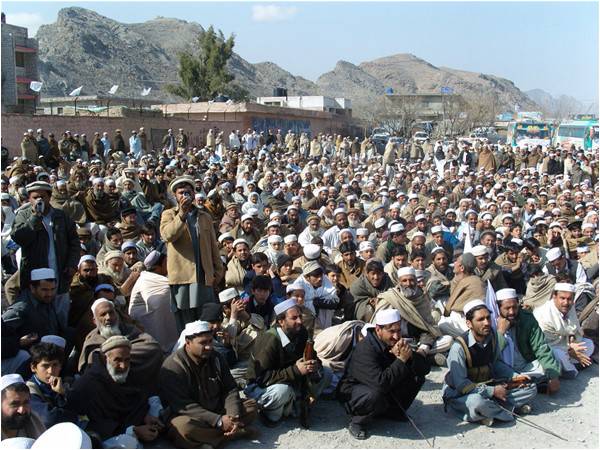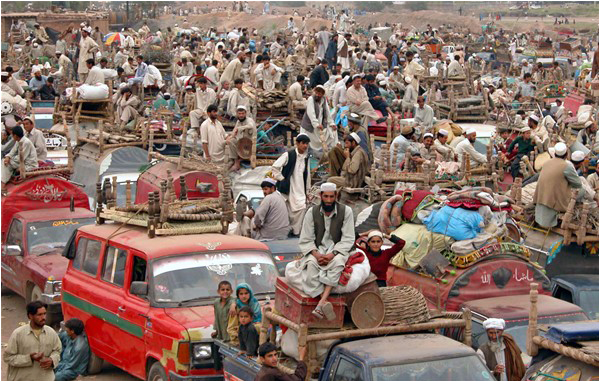
The Federally Administered Tribal Areas or Fata and Khyber-Pakhtunkhwa are waiting to see what the cabinet decides on March 12 when it takes up a report with recommendations on whether to merge the two. The Pakistan Muslim League-Nawaz government had, after a massive military operation in the tribal areas, formed a committee to recommend reforms for Fata. The committee has suggested three options in its report titled ‘Report of the Committee on FATA Reforms’.
The report says that there are mainly three wishes of the people. One, which is in majority, is to see Fata merge with Khyber-Pakhtunkhwa province. The second wish is to see Fata as a separate province. The third is that there should be a separate council for Fata’s people, like the one in Gilgit-Baltistan, that they could run themselves.
“People of Fata need to be part of mainstream [society],” says a leader of the Pakhtun nationalist Awami National Party, Afrasiab Khattak. “And to merge Fata with KP is the best and most rational solution.” When presented with the argument for a separate province as it could mean more elected representatives, a larger share of the federal resources etc. Khattak says that it was a British policy to divide the Pashtuns, but the merger of Fata and KP will bring them together in one province. A merger will give the Pakhtun a greater chance to see representation in the National Assembly as well. And he adds, the tribal people will be able to handle their problems much better under the provincial set-up of Khyber-Pakhtunkhwa.
If there are supporters of the suggested reforms, there are people who have not agreed with the way they were elicited. A former ambassador, who belongs to one of Fata’s seven agencies, South Waziristan, Ayaz Wazir, points out that people from Fata should have been part of the reform committee. He says this as the committee consisted of Advisor to the Prime Minister of Foreign Affairs Sartaj Aziz, KP Governor Zafar Iqbal Jhagra, SAFRON Minister Lt-Gen (retd) Abdul Qadir Baloch, Minister for Law & Justice Zahid Hamid, National Security Adviser Lt-Gen (retd) Nasser Khan Janjua, SAFRON Secretary Muhammad Shehzad Arbab. Indeed, this point was noted by others and was brought up at a press conference with committee member Abdul Qadir Baloch. He responded by saying that the tribal people had differences among each other which is why they were not made part of the committee. But this reasoning has not gone down well.

Another sore point is the breadth of the committee’s work. “The committee should not say that the majority of Fata’s people want a merger with KP as the committee did not meet more than a thousand tribal people and they all were nominated from the local government,” he argues. This is an immature effort, he adds. “How could you make such a decision when the majority of the people don’t even know what’s going on?”
Wazir leans towards Fata becoming a separate province as he feels this would end the tribal people’s long-standing grievances. If they had their own province, he argues, they would be able to develop it themselves enthusiastically and in competition with the KP administration. This would mean making their own policies as well.
Perhaps what drives the desire for reforms the most has been to do away with the draconian Frontier Crimes Regulation (FCR) law, which punished entire tribes for one man’s crimes among others. Fata has been run under the FCR since 1901 when the British rulers formed them to tackle Pashtun opposition. With time, the FCR laws were changed in almost all parts of sub-continent but they persisted in Fata. The previous government of the Pakistan Peoples Party had started to look into reforms and had approved a Political Party Act for the area. According to this law, people who wanted to contest any kind of elections could from their political party’s platform which had been impossible before. But as the FCR is still in place, human rights organisations and society at large have long called for them to be done away with. “Whatever the people of Fata want, they most definitely don’t want the black laws of the FCR,” says writer Khan Zeb Burki.
Assurances have been given that the reforms will be implemented. In the absence of action, however, theories have been circulating on the reason for the delays. The most popular one is that the government is being stingy about the money; the report recommends the government give Fata around one hundred billion rupees. MNA Sajid Turi from Fata’s Kurram Agency said, however, that the government would indeed release such a budget for Fata and intended to work on providing 20,000 jobs along with undertaking the development of infrastructure. Pressure is building, however. In a convention organized in Islamabad by a parliamentary leader of Fata, Shah Gul Afridi, people demanded that the government implement its promises that were made earlier on. Strong words have been emanating from even members of parliament such as Fata’s Maulana Jamaluddin who felt that the government was once again “lying” to the people of Fata. For him the simple barometer is how the government has tackled the issue of people displaced by the military operations from these areas. “Still a good number of tribal people are living as displaced people in different parts of the country and Afghanistan,” he says. “Why is the government not doing something to put them at ease first?”
The report says that there are mainly three wishes of the people. One, which is in majority, is to see Fata merge with Khyber-Pakhtunkhwa province. The second wish is to see Fata as a separate province. The third is that there should be a separate council for Fata’s people, like the one in Gilgit-Baltistan, that they could run themselves.
Perhaps what drives the desire for reforms the most has been to do away with the draconian Frontier Crimes Regulation (FCR) law, which punished entire tribes for one man's crimes among others
“People of Fata need to be part of mainstream [society],” says a leader of the Pakhtun nationalist Awami National Party, Afrasiab Khattak. “And to merge Fata with KP is the best and most rational solution.” When presented with the argument for a separate province as it could mean more elected representatives, a larger share of the federal resources etc. Khattak says that it was a British policy to divide the Pashtuns, but the merger of Fata and KP will bring them together in one province. A merger will give the Pakhtun a greater chance to see representation in the National Assembly as well. And he adds, the tribal people will be able to handle their problems much better under the provincial set-up of Khyber-Pakhtunkhwa.
If there are supporters of the suggested reforms, there are people who have not agreed with the way they were elicited. A former ambassador, who belongs to one of Fata’s seven agencies, South Waziristan, Ayaz Wazir, points out that people from Fata should have been part of the reform committee. He says this as the committee consisted of Advisor to the Prime Minister of Foreign Affairs Sartaj Aziz, KP Governor Zafar Iqbal Jhagra, SAFRON Minister Lt-Gen (retd) Abdul Qadir Baloch, Minister for Law & Justice Zahid Hamid, National Security Adviser Lt-Gen (retd) Nasser Khan Janjua, SAFRON Secretary Muhammad Shehzad Arbab. Indeed, this point was noted by others and was brought up at a press conference with committee member Abdul Qadir Baloch. He responded by saying that the tribal people had differences among each other which is why they were not made part of the committee. But this reasoning has not gone down well.

Another sore point is the breadth of the committee’s work. “The committee should not say that the majority of Fata’s people want a merger with KP as the committee did not meet more than a thousand tribal people and they all were nominated from the local government,” he argues. This is an immature effort, he adds. “How could you make such a decision when the majority of the people don’t even know what’s going on?”
Wazir leans towards Fata becoming a separate province as he feels this would end the tribal people’s long-standing grievances. If they had their own province, he argues, they would be able to develop it themselves enthusiastically and in competition with the KP administration. This would mean making their own policies as well.
Perhaps what drives the desire for reforms the most has been to do away with the draconian Frontier Crimes Regulation (FCR) law, which punished entire tribes for one man’s crimes among others. Fata has been run under the FCR since 1901 when the British rulers formed them to tackle Pashtun opposition. With time, the FCR laws were changed in almost all parts of sub-continent but they persisted in Fata. The previous government of the Pakistan Peoples Party had started to look into reforms and had approved a Political Party Act for the area. According to this law, people who wanted to contest any kind of elections could from their political party’s platform which had been impossible before. But as the FCR is still in place, human rights organisations and society at large have long called for them to be done away with. “Whatever the people of Fata want, they most definitely don’t want the black laws of the FCR,” says writer Khan Zeb Burki.
Assurances have been given that the reforms will be implemented. In the absence of action, however, theories have been circulating on the reason for the delays. The most popular one is that the government is being stingy about the money; the report recommends the government give Fata around one hundred billion rupees. MNA Sajid Turi from Fata’s Kurram Agency said, however, that the government would indeed release such a budget for Fata and intended to work on providing 20,000 jobs along with undertaking the development of infrastructure. Pressure is building, however. In a convention organized in Islamabad by a parliamentary leader of Fata, Shah Gul Afridi, people demanded that the government implement its promises that were made earlier on. Strong words have been emanating from even members of parliament such as Fata’s Maulana Jamaluddin who felt that the government was once again “lying” to the people of Fata. For him the simple barometer is how the government has tackled the issue of people displaced by the military operations from these areas. “Still a good number of tribal people are living as displaced people in different parts of the country and Afghanistan,” he says. “Why is the government not doing something to put them at ease first?”

